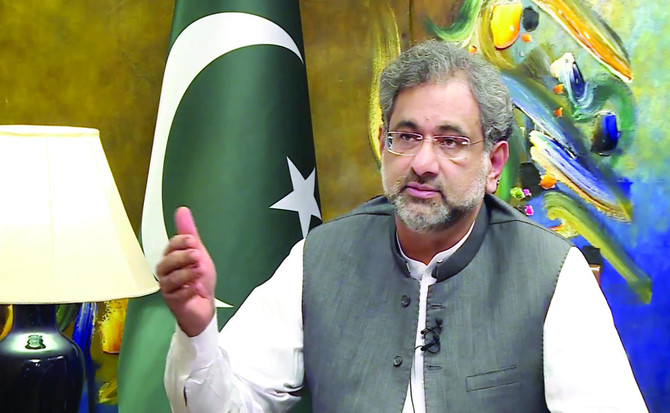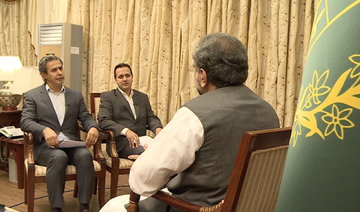ISLAMABAD: The days of Pakistan depending on the US to meet its military and other requirements are over, Prime Minister Shahid Khaqan Abbasi told Arab News during an exclusive interview.
The world should recognize Pakistan’s efforts in fighting the “world’s war” on terror, he said, in his first interview since returning from the UN General Assembly (UNGA) in New York in September.
“If one source dries up, we have no option but to go to another source. It may cost more, it may consume more resources, but we have to fight that war, and that’s what we emphasized to all the people that we met,” Abbasi added.
“Any sanctions or restraints… put on our systems only degrades our efforts to fight terror, and it affects the whole equation in this region,” he said.
“We have major US weapons systems in our military, but we’ve also diversified. We have Chinese and European systems. Recently, for the first time we inducted Russian attack helicopters.”
Complexity of governance
It has been two months since Abbasi assumed office after being voted in by Parliament via special elections on Aug. 1. Pakistan Muslim League-Nawaz (PML-N), the ruling party, holds the numbers in Pakistan’s National Assembly, and Abbasi being a staunch loyalist and trusted comrade of Nawaz Sharif was the suitable choice.
He has hit the ground running, facing a barrage of domestic and international challenges including terrorism, an energy deficit, and economic and regional volatility.
“It’s a complex job,” he said, adding that governing a country with a ballooning population of over 207 million is no walk in the park.
“Pakistan is one of the largest countries in the world… It’s a nuclear power. We have a challenging neighborhood. There’s a war on terror in the country. There are issues in Afghanistan. There’s a very large foreign military presence there... We have a neighbor to the east with which we’ve had several wars. They (India) are also a nuclear power. We have a dispute. They occupied Kashmir, which is our territory… The economic challenge is (also) there.”
Elections
Abbasi, 58, is a US-qualified electrical engineer with a bachelor’s degree from the University of California and a masters from George Washington University.
He was a pilot for 40 years, and is Pakistan’s first premier to have flown an F-16 aircraft during an air force training exercise.
He entered mainstream politics in 1988 and later became an MP. Being part of a politically connected family helped him become an accomplished politician, being elected to Parliament six times.
Abbasi is also a prosperous businessman, having launched Pakistan’s first successful budget airline and keeping it profitable when other private carriers shut down.
The incumbent government’s term finishes on June 4, 2018, and he is confident that the next general elections will be held within two months of that.
“Whatever happens, elections will happen on time and in early August. Pakistan will, God willing, have a new government. Hopefully the same party (PML-N) will come to power,” he said, smiling.
UNGA and US
Abbasi and his delegation held meetings with several “key players” on the sidelines of the UNGA, including eight heads of state, the UN secretary-general, US Vice President Mike Pence and international investors.
The meeting with Pence was “very constructive,” Abbasi said, adding that there was “also a small interaction with President (Donald) Trump at his reception.”
This was the first high-level communication between the two allies since Trump strongly criticized Pakistan in his Afghanistan and South Asia strategy that he unveiled on Aug. 21.
“There was no meeting scheduled (with Trump). In fact, the meeting with Vice President Pence wasn’t scheduled. It was at their request,” Abbasi said. “This was a visit to the UN to basically present Pakistan’s case at the General Assembly.”
Bilateral ties
The “candid” discussion with Pence was essential for official engagements in the future because when Trump’s policy statement on South Asia came out, there were “a lot of apprehensions on what it meant, and what it meant for Pakistan-US relations,” Abbasi said.
“I think we moved substantially forward in that direction. Whatever concerns they (the US) have, we’ve shown our willingness to address those concerns.”
The meeting paved the way for one between Pakistani Foreign Minister Khawaja Asif and US Secretary of State Rex Tillerson on Wednesday in Washington.
They discussed Trump’s South Asia policy, and Asif told Tillerson that Islamabad pursues a zero-tolerance approach to “all terrorist and militant groups.”
This was in response to Trump’s assertion that Pakistan harbors “agents of chaos,” which he blames for Afghanistan’s continued instability.
On Tuesday, Defense Secretary James Mattis said the US was willing “one more time” to work with Pakistan on Afghanistan, but would resort to measures set by Trump in case of non-compliance regarding the allegations of support for militants.
Abbasi said: “We can categorically state that we don’t provide any sanctuaries to anybody. The bottom line is… today we have a common objective: To destroy terror and bring peace to Afghanistan.”
Afghanistan
“We’re partners in the war on terror, and that’s what we emphasized. We emphasized to everybody we met there (at the UNGA) that nobody wants peace in Afghanistan more than Pakistan,” added Abbasi.
“The reality today is that much of the area bordering Pakistan is controlled by the Taliban. The people we’re fighting in Pakistan today, their sanctuaries are in Afghanistan, their leadership is living there, the planning is done there, the logistical bases are there, and they regularly cross the border and attack our installations. We recently had a suicide attack on the deputy chairman of the Senate. He survived, but 22 people were killed. It was by an Afghan national who had crossed the border to attack his convoy deep inside Pakistan,” Abbasi said.
“We’re fencing our border. We’re open to Afghan liaison officers. We have Afghan refugees here. So if anything is pinpointed and the intelligence is provided, we take action,” he added. “Whatever happens in Afghanistan affects us. Whatever happens here affects them.”
India’s role
Pakistan wants peace in Afghanistan via a solution that “is owned and led by the Afghans,” said Abbasi, warning that Washington’s desire to include India would be detrimental.
“We don’t believe that injecting India into the Pakistan-US relationship will help resolve anything, especially in Afghanistan, where we don’t see any role for India. India has a relationship with the US. That is between them and the US.”
Pakistan wants an “equal relationship or partnership with the US, like every other nation,” he said.
It wishes to work with the US “to resolve regional” and “global issues… ranging from the economy to nuclear” matters.
Cost of war
Pakistan has fought “a very hard and vicious” war on terror, said Abbasi, adding that “200,000 of our troops are deployed. We have 6,500 shaheeds (martyrs) in the army. We have 21,000 of our citizens who’ve been killed, including police personnel. Almost 35,000 people have been seriously injured.”
He added: “Nobody has fought a bigger war on terror than we have, with our own resources. Even the most conservative economic estimates of Pakistan’s losses are over $120 billion. It has been a very difficult war, but our army has performed very well.”
To read the full coverage, click here

















